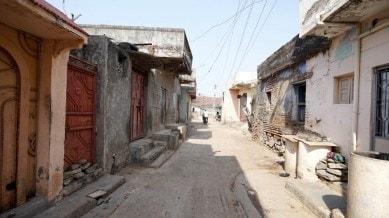Stay updated with the latest - Click here to follow us on Instagram
In Gujarat’s ‘epicentre of cow slaughter convictions’, silence over life to 3 of a family
The state govt welcomes the order as “historic”, the Special Public Prosecutor says the convictions in Amreli district have “instilled fear”

The Mota Khakivad locality in Amreli town now enjoys a dubious fame. On November 11, it made “history” when three members of a family here were sentenced to life for cow slaughter, along with a collective fine of over Rs 18 lakh.
In the past three years, Amreli district has seen 24 convicted in at least 14 cases under the Gujarat Animal Preservation Act. But the case of the Solankis stands out for the length of the sentence, and for involving three members of one family – brothers Kasim and Akram, 20 and 30 years of age, respectively, and their uncle Satar, 52.
In Mota Khatkivad, a locality with a mixed population of Muslims and Hindus and many such as the Solankis involved traditionally in butchery (giving the area its name), neighbours turn down queries with, “We do not know anything”. The family refuses to talk, saying it “fears the consequences”.
A local who knows the family says the uncle and the brothers live together. While Kasim is unmarried, Akram has a wife and four children. “The family is in shock,” he says. “A person gets a death sentence or life imprisonment for killing a human being… Here, three people have been sentenced to life for killing a calf of a cow.”
He adds: “The family’s three main earning members are in jail now. I do not know how they will raise the Rs 18 lakh for the fine, or go about appealing against the conviction.”
The Gujarat Animal Preservation Act prohibits cow slaughter and sale of cow meat in the state. In 2017, the BJP government amended the Act and increased the maximum punishment for cow slaughter from seven years to life imprisonment.
Akram was on bail in an earlier case under the Act, in which he had been sentenced to three years’ rigorous imprisonment and a fine of Rs 5,000, when held in this one. As per charges in this case, on November 6, 2023, police, acting on a tip-off about cow slaughter and sale of beef, raided the Solanki residence and allegedly recovered beef, remains of a slaughtered calf and equipment used for slaughtering an animal.
Subsequently, a veterinary doctor and a forensic test confirmed the recovered meat to be that of a cow.
Apart from provisions of the Gujarat Animal Preservation Act, the Amreli Sessions Court that gave the Solankis life also convicted them for “destroying any object held sacred by any class of persons with the intention of thereby insulting the religion of any class of persons” and for “mischief by killing or maiming cattle of any value”. They were fined Rs 6.08 lakh each, with the court ordering that they would have to serve more time if they failed to pay.
The Gujarat government welcomed the order as “historic” and said it showed its commitment to cow preservation in Gujarat.
Chandresh Mehta, the Special Public Prosecutor in cases of cow slaughter in Amreli district, is associated with the VHP. He called the judgment “landmark” and the result of “a number of factors”. “There was a timely tip-off, the police raid was conducted successfully, there was strong scientific and documentary evidence, very good investigation, and evidence of witnesses.”
He hopes the judgment will prove “a strong deterrent” for offences of cow slaughter in Gujarat. “It will set an example for those who indulge in such acts.”
Mehta also attributed the high number of convictions in Amreli district under the Gujarat Animal Preservation Act – with around 11 of the 14 convictions for cow slaughter – to his “dedication”.
“Amreli has emerged as an epicentre of such convictions in Gujarat because I work hard on the cases and its trial, giving attention to minute details,” he said.
Nine of the convictions have come in the Court of Sessions Judge Rizvana Bukhari, including the Solanki case.
According to Mehta, “Because of these cases and convictions, cow slaughter has decreased significantly in Amreli. In the last two years, only one or two cases (under the Gujarat Animal Preservation Act) have been reported in the district. The convictions have instilled fear in those indulging in such acts.”
Mota Khatkivad locality falls under Ward No. 9 of Amreli Municipality. Corporator Iqbal Bilakhiya said he agrees with the conviction of Solankis as they were found to be committing a crime. “But there are many cases where the convictions are not right… The government and police act with prejudice under pressure from groups like the VHP on such issues,” Bilakhiya said.
Hoping that such wrong convictions would be overturned on appeal, he added that if the government cared about cows, “it should also remedy the issue of stray cows on city roads”.
Nitin Karya, an Amreli resident, agrees. He says cows are sacred to him and welcomes the court cases for bringing to light “such activity)” but adds that the government should also find a way to deal with the issue of stray cows.